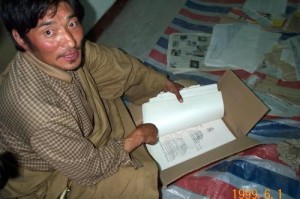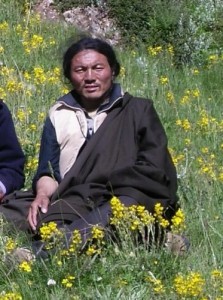UPDATE: In a Tweet following the conclusion of Karma Samdrup’s trial on June 22, his lawyer, Pu Zhiqiang, stated: “Karma Samdrup 15 yr sentence, 5 yr deprivation political rights, 10K RMB fine (US $1,500)”. The court in Xinjiang found Karma Samdrup guilty on what are regarded as trumped-up charges for excavating and robbing ancient tombs – a charge initially brought and allowed to drop in 1998.

Karma Samdrup
There are fears for the safety of a leading Tibetan environmentalist and philanthropist, Karma Samdrup, his two brothers, two cousins, other relatives and supporters in a major case in which prominent Tibetans have been targeted and imprisoned despite no evidence of political activities. The three brothers, who are now all in custody and facing charges, had been regarded as model citizens and previously acclaimed in the Chinese state-run media for their environmental and cultural work.
Karma Samdrup, a 42-year old businessman, well-known collector of Tibetan art and founder of the award-winning Three Rivers Environmental Protection Group, appeared in court yesterday in Xinjiang. He was detained following unsuccessful efforts to secure the release of his two brothers, Chime Namgyal and Rinchen Samdrup, who were imprisoned on August 7 2009 after their efforts to conserve wildlife in their home area of Chamdo (Chinese: Changdu) Prefecture in the Tibet Autonomous Region clashed with the local authorities, according to reports from Tibetans.
Karma Samdrup’s wife and lawyer told the Associated Press (AP, June 22, 2010), that he had appeared in court in Yanqi County, Xinjiang, looking “gaunt and shrunken” during Tuesday’s opening session. They also said that he told the court that during months of interrogation, officers beat him, deprived him of sleep for days on end, and drugged him with a substance that made his eyes and ears bleed.
In a remarkable blog written after her attendance at the trial and posted online today, Karma Samdrup’s wife Dolkar Tso [Chinese transliteration: Zhengga Cuo] wrote: “[When speaking in court he] paused for a while, ‘Today my friends and relatives are here, and there is probably a lot I shouldn’t say.’ The account we heard afterwards exceeded our worst imaginations, we heard about hundreds of different cruel torture methods, maltreatment around the clock, hitherto unheard of torture instruments and drugs, hard and soft tactics, and even of fellow prisoners being grouped together to extract a confession. If he did not reveal certain details he would be mentally tormented. If he wanted to eat or go to the toilet he had to write an ‘IOU’, an ‘IOU’ which has already amounted to 660,000 RMB ($ 96,864). The ‘purchased’ food would first be crushed by people using their feet, there would be beatings for no reason, this was common and occurred too many times to count. He said in a sad voice that he had already prepared for death and he had written a letter to tell his relatives what to do. Two elderly interpreters had red eyes and started crying bitterly.” The blogpost, entitled “Praying” is translated from the Chinese by the website High Peaks, Pure Earth.
Karma Samdrup’s mother ‘beaten unconscious’ during detention of brothers
As concerns about the three brothers’ situation increased in the context of an intense security crackdown in Tibet, new information has reached ICT about other Tibetans linked to the case. Their cousin, Sonam Choephel, has been sentenced to one and a half years of re-education through labor (RTL) for petitioning in December last year in Beijing against the detention of Rinchen and Chime. Twenty villagers from Gonjo (Chinese: Gongjue) in Chamdo, the brothers’ home area, were detained in Chamdo, interrogated and tortured for 40 days after they went to Beijing to petition against the brothers’ detention.
The whereabouts of another cousin, a monk called Rinchen Dorje, following his detention by police in March, is unclear. Rinchen Dorje, a Tibetan Buddhist monk who speaks Chinese, had acted as Karma Samdrup’s interpreter in 1998 when he was purchasing antiques in Xinjiang. He is believed to have been detained in March this year and taken to Xinjiang initially. He was then taken by the authorities to the Tibet Autonomous Region (TAR) after an alleged escape attempt, according to Tibetan sources in contact with people in the area. When his relatives tried to find him in the TAR, they were unable to locate him within the prison or the justice system there.
Karma Samdrup’s mother, who is in her seventies, was beaten unconscious by police led by an Party official from Chamdo prefecture called Chen Yue during the raid in which Rinchen Samdrup and Chime Namgyal were being
taken into custody from the family home in August, 2009.
Rinchen Samdrup’s trial ‘postponed’
 Rinchen Samdrup  Chime Namgyal |
Rinchen Samdrup, 44, Karma Samdrup’s older brother, was originally due to go on trial on Thursday in Chamdo on a “state security” offence but the trial was abruptly cancelled, according to Chinese lawyer Pu Zhiqiang, who is representing Karma Samdrup.
Rinchen Samdrup was detained from his home with his younger brother Chime Namgyal, after they accused local officials in their home area of poaching endangered species. There are fears that Rinchen Samdrup will receive a long sentence. Since his detention in August, 2009, he has been detained in the Chamdo Detention Center. According to Tibetan and Chinese sources familiar with the case, when his family enquired about his whereabouts last month, the court responded that his case had been already submitted to the courts in Lhasa. When his Beijing-based lawyer, Xia Jun, then traveled to Lhasa from Beijing to ask about the case, he was told by the Lhasa courts that they had not received any details.
Two articles in People’s Daily and Beijing Youth News profile Rinchen Samdrup for winning awards for his environmental conservation work from the Ford Motor Company Conservation and Environment Protection Grants (China). (http://www.chinatibetnews.com/huanbao/2010-01/12/content_384895.htm). Both of these articles were published even while Rinchen Samdrup was in detention. An acclaimed book by the leading environmental journalist Liu Jianqing profiled the work and life of both Karma Samdrup and Rinchen, the most recent being Tianzhu, “Heavenly Beads”, published by the TAR government’s own printing house in Lhasa last year. Karma and Rinchen’s environmental organization also won a million yuan (around $130,000) grant as a “Model Project” from the One Foundation, a charity created by the Chinese martial art movie star Jet Li.
There are also concerns for the welfare of Chime Namgyal, who has been tortured while serving a 21-month re-education through labor sentence for “harming national security” according to Tibetan sources in the area. Just over a week ago, Chime Namgyal’s health deteriorated dramatically and he was sent to hospital. According to the same sources, he cannot walk or eat on his own, and detention center staff feared he would die in custody.
The re-education through labor management committee from Chamdo Prefecture alleged that Chime Namgyal had set up an “illegal” environmental organization that “illegally collected three digital disks of information and video footage about the environment, the natural resources and the religion of Changdu prefecture … provided pictures and material for the illegal publication ‘Forbidden Mountain, Prohibited Hunting’, illegally possessed reactionary propaganda materials from the Dalai clique abroad and organized the local residents into irregular petitioning of the authorities… therefore severely interfering with state power organizations at the local level and effectively harming social stability.” (ICT translation from the Chinese RTL document).
Karma Samdrup, who appeared in court yesterday in Xinjiang, is being held on what are regarded as trumped-up charges for excavating and robbing ancient tombs – a charge initially brought and allowed to drop in 1998. The environmentalist and philanthropist, also known as the “King of Heavenly Beads” for his important collection of Tibetan cultural artifacts, was arrested in Chengdu, the provincial capital of Sichuan, in early January. He was taken to Xinjiang because this is where the charges originated.
The lawyer, Pu Zhiqiang, has told foreign reporters based in Beijing that he did not know why the charges had resurfaced after so long, saying: “He wasn’t really expecting it. This case was many years ago and at that time the Xinjiang police had already made a decision recognizing Karma Samdrup was not guilty and the grave robbers (who were)…have already been punished.” (Reuters, June 1). Although the trial is being held in Xinjiang, some informed observers believe that it is the Tibet Autonomous Region authorities driving the proceedings, due to local officials’ interests being challenged by the brothers’ environmental work.
Pu Zhiqiang has also expressed serious concern about obstacles presented by the authorities in Karma Samdrup’s case, which Human Rights Watch has categorized as repeated violations of China’s own criminal procedure law. He was denied the right to meet anyone, including his wife and his lawyers, for more than six months after his arrest, and the court refused to allow Karma Samdrup’s lawyers to photocopy the 70-page prosecution file to prepare his defense, insisting that they only copy excerpts (Human Rights Watch report – June 10).
In a letter to the court, lawyer Pu Zhiqiang wrote: “It should be said that even though we overcame many hardships and have striven to ‘complement’ the work of the court, ultimately because the case is complex, and because it is from long ago and because the case file is confused, we encountered bottlenecks in the practice of our profession and face extremely serious difficulties.” (Translation from the Chinese by ICT, reproduced in a blogpost of June 3 at http://woeser.middle-way.net/2010/06/blog-post_411.html).
In her blogpost today about the court proceedings, Karma Samdrup’s wife writes: “The lawyer also almost started crying. During the afternoon trial, the submission of evidence and translations was an endless process, endless but extraordinary. All of the evidence that was ‘temporarily put aside’, to my understanding, contained many loopholes and contradictions. Even the lawyers seemed to think that much was illegal in the procedures and they raised their doubts. It was just a pity that the panel discarded them as ‘unrelated to the respective issue’ or said that ‘this has already been clarified’.” (High Peak, Pure Earth).
The cases are in the context of a deepening crackdown in Tibet in which almost many expressions of Tibetan identity or support for Tibetan culture can be accused of being ‘reactionary’ or ‘splittist’. For the first time since the Cultural Revolution intellectuals and prominent figures in the community are being targeted more systematically for their work or views. The cases of the three brothers are different to previous Tibetan political cases, which have involved some form of protest or dissent – there is no evidence of any political activities or even of opposition to mines or corporations by Karma Samdrup, Rinchen Samdrup or Chime Namgyal. (ICT report, A ‘Raging Storm’: The Crackdown on Tibetan Writers and Artists after Tibet’s Spring 2008 Protests).

